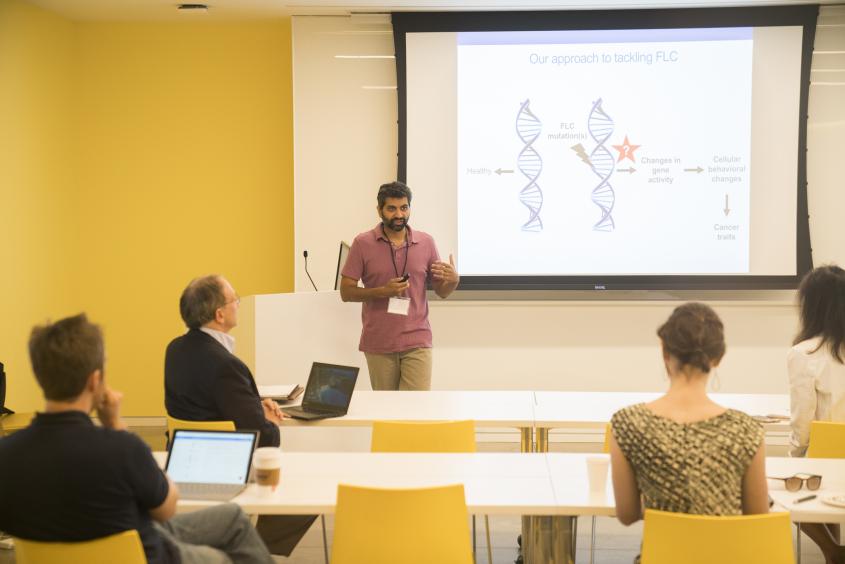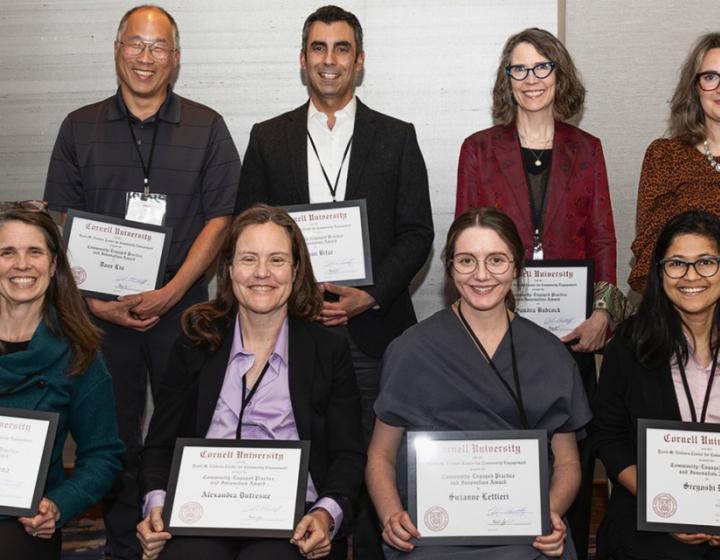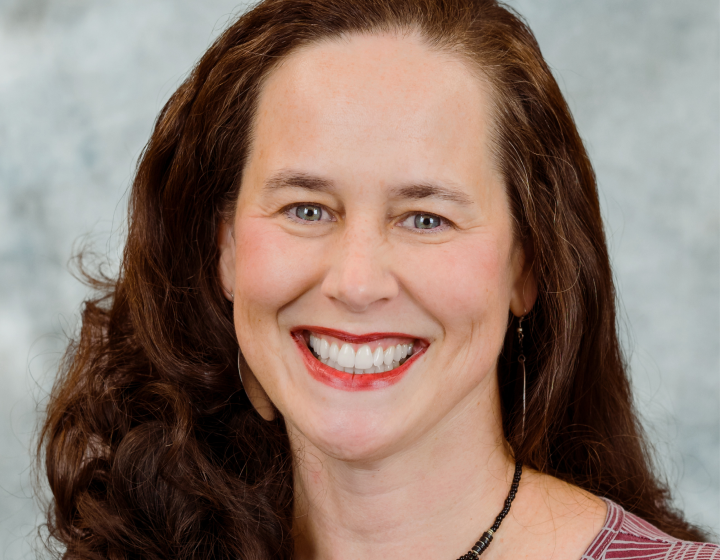Advocates and scientists connect during Fibrolamellar Cancer Foundation visit to CVM
The Fibrolamellar Cancer Foundation (FCF) recently held a research event at the College of Veterinary Medicine hosted by Praveen Sethupathy, Ph.D '03, associate professor of biomedical sciences, who presented to fellow researchers, foundation board members, and a patient and his family on his current research toward finding therapeutic targets to fight fibrolamellar cancer. The Sethupathy lab specializes in discerning the function of non-coding RNAs, and through ongoing collaboration with other researchers, has discovered promising targets in the fight against this disease. “Praveen has done an admirable job of sharing information with other institutions,” says John Hopper, president of the FCF.

Dr. Robert Weiss, associate dean for research and graduate education, started the event with a brief overview of Cornell’s extensive cancer research program. “Cornell has traditional strengths in life sciences …and we have what is arguably the best vet school in the world here, which provides a number of unique opportunities in clinical trials and comparative cancer research,” Weiss said, adding that Sethupathy was an ideal fit for the research community at the college. “He’s the type of scientist who makes everyone around him better, and we’re really delighted that he’s here.”
Sethupathy followed up with a step-by-step account of his work in understanding the underpinnings of fibrolamellar cancer. With help from researchers at the University of North Carolina, Duke University, the University of Washington, and Memorial Sloan Kettering Cancer Center, Sethupathy and his team zeroed in on a small group of microRNAs that may together control the highly invasive/metastatic nature of fibrolamellar. “We are interested in evaluating whether targeting all these microRNAs could serve as an effective ‘cocktail’ therapy,” Sethupathy said. The group has also leveraged the new ChRO-seq technique, pioneered in Charles Danko’s laboratory at the Baker Institute, to uncover a novel pathway tied to fibrolamellar, which includes a specific long non-coding RNA (lncRNA) that is unusually high in fibrolamellar tissues. The Sethupathy team is currently utilizing state-of-the-art CRISPRa technology to evaluate the importance of this lncRNA in causing tumor formation and growth.
Fibrolamellar hepatocellular carcinoma is a rare form of liver cancer—affecting only one in five million-that typically occurs in adolescents with no history of liver disease. No effective treatment options exist beyond removal of cancerous portions of the liver before metastasis. Unfortunately, diagnoses typically occur during advanced stages of the disease when metastasis has already occurred. The FCF is the only existing advocacy organization for fibrolamellar cancer, “Which puts a lot of pressure on us, but also gives us a great deal of opportunity to create positive change,” said Hopper.

Tucker Davis, a fibrolamellar patient, started the FCF in 2008, with a mission to find a cure, raise awareness, and create a supportive community among other fibrolamellar patients. Davis succumbed to the disease in 2010, but his parents, Marna and Chuck Davis, along with other friends and colleagues, have carried on in his place.
Part of the FCF’s current efforts center on funding researchers like Sethupathy, who they met and began funding as a scientist at the University of North Carolina. “That relationship with him was so strong, we wanted to continue that support when he moved over to Cornell,” Hopper explains. The FCF gave a $100K bridge grant to sustain the Sethupathy lab’s efforts as they transitioned to Cornell in 2017, and are granting another $390K to the group this year, and a $1k publishing prize to lab member and graduate student Tim Dinh. Besides Sethupathy’s foundational discoveries in the molecular and genomic underpinnings of fibrolamellar cancer, the FCF values his collaborative approach to this life-saving science. “The silos that are typically present in academia are breaking down in cancer research like this,” said Hopper. “Researchers like Praveen are sharing information—even before publishing—when those discoveries might accelerate a path to a cure.”
-By Lauren Cahoon Roberts





